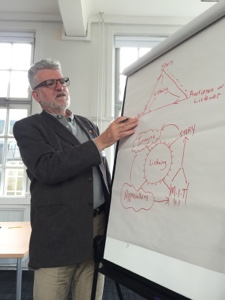During the end of last week, I was thrilled to participate in the workshop 'Telling the Story of Your Research' at Moray House Graduate School of Education. This was the culmination of five months of working with my PhD student colleagues Carla, Krystallia, and Rebekah to gain funding, plan, and develop this workshop (see my blog post on our journey). On Thursday, fourteen of us PhD students came together for the first time to reflect on our own PhD journeys and share them with each other.
The first morning started with Michael Williams, our storytelling facilitator and guide, telling us that, 'In the end, you need to tell a good story in your thesis and defence'. We discussed the importance of engaging stories that connect with the audience and allow our stories to resonate with them. Our first activity involved using the metaphor of a tree to have us visualise and draw the outline of our stories. We started with the roots to show our diverse backgrounds and motivations for conducting the PhD. Then we moved on to show the root of our work, including the systems and people supporting our journeys. Next we moved to the leaves to show our aims, the fruit showing where we get our energy and passion, and what nourishes us throughout the journey. Finally, we drew the compost bin of things we have already gotten rid of or want to get rid of (such as anxiety or fears of not being good enough to survive this journey).
Next, we went around the circle one by one to share our personal stories and listen to others' stories about their PhD journey. This was a pivotal part of the workshop, since we went to being individual PhD students in the same workshop to developing a sense of community with trust and support in the room. Since I am a part-time student who is not often at Moray House, I knew some of the participants but I didn't know much about their research. For those who I knew better, I had talked with them or had watched their academic presentation of their work but I didn't know their motivations for undertaking the PhD journey. It was wonderful to hear everyone's story, not selecting just a few people to volunteer, because it helped our group come together knowing that everyone would share their story, and everyone would also listen to and give appreciation for others' stories. We were putting ourselves into the story of our research by showing our personal motivations and sharing our motivations and aims.
Through the sharing of our stories and giving appreciation for others' work, it was wonderful to see themes and synergies arise between our research. Many of us are looking at how to tackle inequalities, inclusivity of diversity, and how to tackle complex problems in today's society by using education. Several of us are also looking at creativity and play in different levels of education, and it was wonderful to hear Patrick's definition that 'creativity is the empowerment of people, allowing their voices to be heard. As I discussed in a previous blog post, creativity and play is a theme that I want to look into more and read up on in my own work. Many of us are working to engage students in their own learning, from the nursery level to primary, secondary, and higher education levels too so it was helpful to hear different perspectives on that. It was courageous that many shared their fears of education not being valued by society or that they don't have what it takes to excel in academia, but it was wonderful to see the hope that all of us have that our work can effect positive change in the world around us.
After the first day of the workshop, I think we all felt excited yet exhausted from the mental work of the day searching inside ourselves to tell our story and listen, sometimes emotionally, to others' stories. We returned for the next day of the workshop with anticipation of new workshop activities helping us to tell our story and to pass through the Hero's Quest. This second day began with a fun activity to help us listen to a partner's story, only asking 'why' and helping them delve deeper into their story. Then, we began role playing the PhD Hero's Quest, with one PhD student making the journey and entering several stages of thoughtful questioning by the others. It was an extremely helpful experience to think of what the viva may entail, and it was also extremely supportive.
Participating in the storytelling workshop was a great experience and I was so glad to see it come together. I developed better connections with my PhD peers, personally by connecting to the story of what drew each of them to their research and also academically by finding connections my their work and my own. I also found it an extremely beneficial experience for stepping back and reflecting on my own journey while practising telling my story and learning how to engage audiences better in future presentations and other situations. I think all of us recognised the clear need for other such workshops that help develop our personal skills as well as our professional skills, promote reflection, and allow us to enhance both our pastoral and academic experience as a PhD student. For me, it drew me into our PhD community and was invaluable in helping me to develop strong connections with my PhD colleagues. I hope that others will organise similar workshops in the future! A massive thank you to the EUSA Schools Fund, EUSA Global Fund, and the Moray House Graduate School for providing the funding to make this possible.






No comments:
Post a Comment